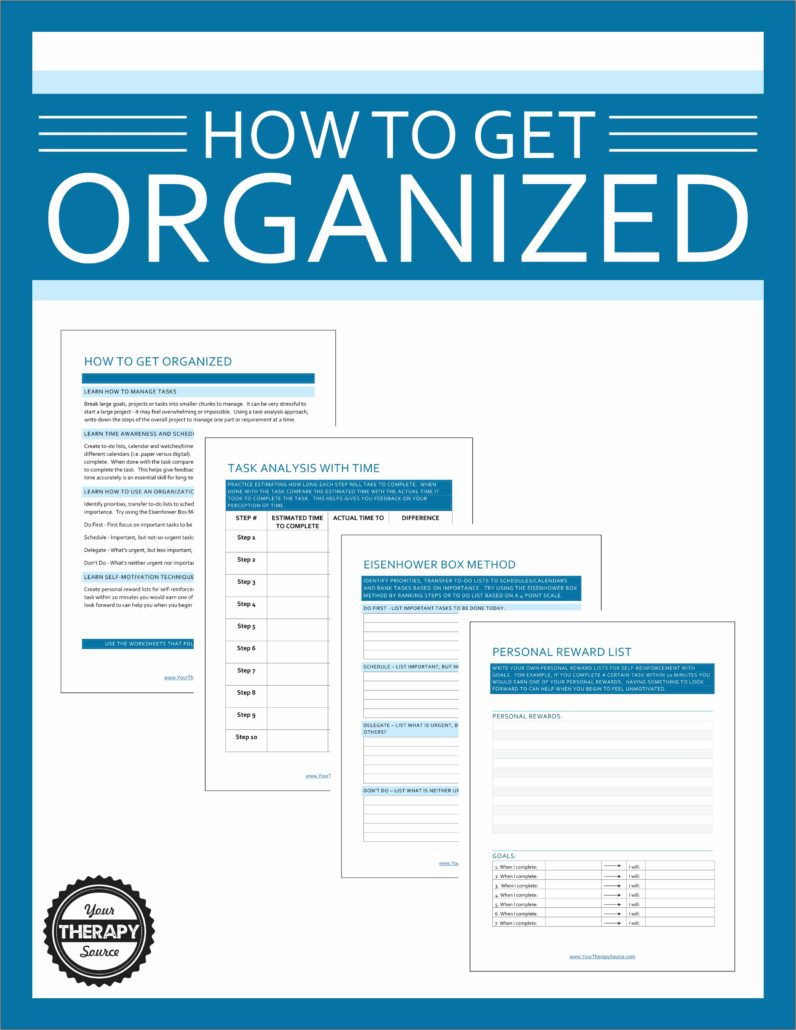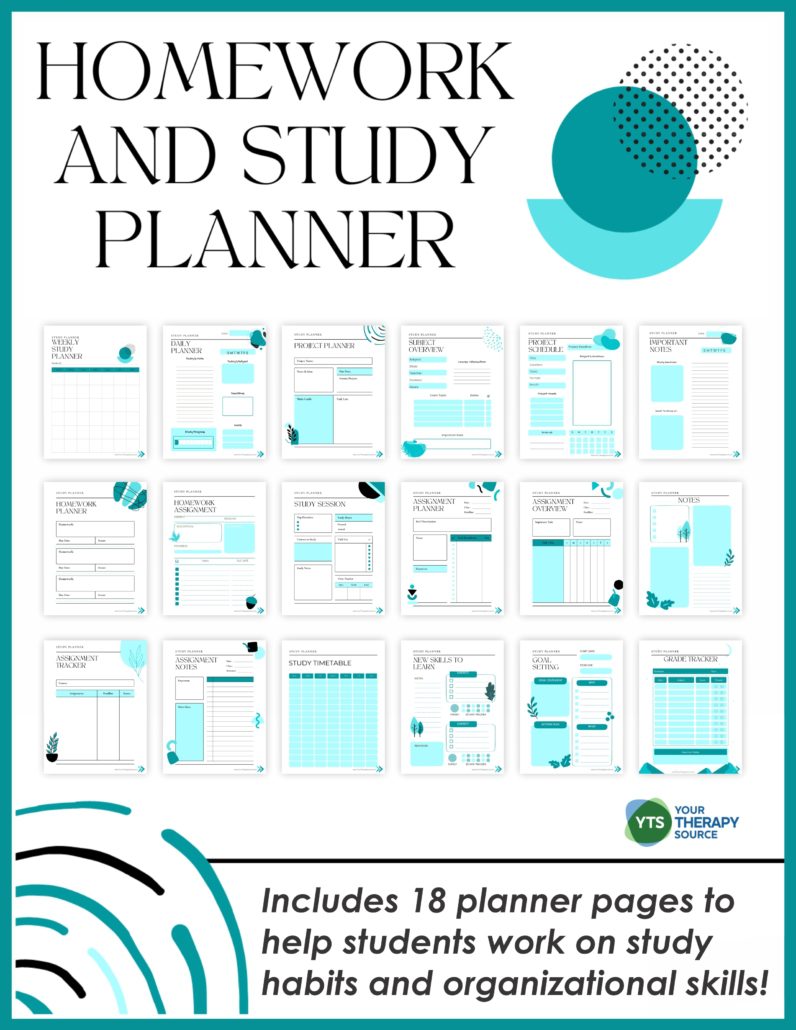Study Skills IEP Goals

Individualized Education Program (IEP) is a customized plan designed to meet the unique needs of students with disabilities. The IEP team, consisting of parents, special education teachers, general education teachers, and other relevant personnel, collaborates to develop specific, measurable, achievable, relevant, and time-bound (SMART) goals and short-term objectives for the student. This article discusses the study skills needed in school and provides examples of study skills IEP goals and objectives in the areas of note-taking, task initiation, organization, and homework habits. Measurable annual goals are an important piece to student success.
Study Skills Needed in School
School districts play an essential role in equipping students with the necessary study skills for academic success. Students need to develop executive function skills such as organization, time management, prioritization, and emotional control. They must learn specific skills and functional goals like note-taking, completing assignments, and managing homework. Special education services can provide individualized support to help students develop these skills, particularly when the child struggles with executive functioning deficits.
Note Taking IEP Goals
Effective note-taking is critical for retaining and recalling information. Special education teachers can help students develop this skill by setting SMART goals and using various tools, such as graphic organizers, visual cues, and direct instruction.
Sample IEP Goal: By the end of the semester, the student will improve note-taking skills by using a graphic organizer to record main ideas and supporting details from a text or lecture, with 80% accuracy, in three out of four consecutive trials.
Short-term objectives:
- The student will identify main ideas and supporting details in a text or lecture.
- The student will use a graphic organizer to categorize information.
- The student will review their notes and edit for clarity and completeness.

Cornell Note Taking Templates – Organized, Effective Note Taking
Task Initiation IEP Goals
Task initiation involves starting a task or assignment, particularly a non-preferred or complex one, without procrastination or delay. Students with executive functioning issues may benefit from breaking tasks into smaller steps, setting specific deadlines, and receiving adult support.
Sample SMART IEP Goal: Over the next six weeks, the student will initiate and complete tasks within the assigned timeframe, with minimal verbal prompts, for 80% of assigned tasks.
Short-term objectives:
- The student will break complex tasks into smaller, manageable steps.
- The student will create a visual schedule or use visual supports to manage deadlines.
- The student will utilize self-regulation skills to reduce emotional response and procrastination.

How to Get Organized Worksheets for Students
Organizational IEP Measurable Goals
Organization is crucial for managing assignments, materials, and time effectively. It is a complex task that many people struggle with in the educational setting, at home and in the work force. Special education teachers can help students develop basic organizational skills through direct instruction, visual reminders, and assistive technology.
Sample SMART IEP Goal: Over the next three months, the student will maintain an organized binder or digital folder for each subject area, with all materials in their designated sections and no more than two misplaced items, as assessed during bi-weekly binder checks.
Short-term objectives:
- The student will categorize materials according to subject areas.
- The student will utilize a color-coded system or digital organization tools to manage documents.
- The student will perform weekly self-checks to maintain the organization of their binder or digital folder.

Study Skills and Student Homework Planner
Homework Habits IEP Goals and Objectives
Developing good homework habits is essential for reinforcing learning and maintaining academic progress. Special education teachers can help students establish a consistent homework routine and manage their assignments effectively.
Sample SMART IEP Goal: Over the next two months, the student will complete and submit 90% of homework assignments on time, as assessed through teacher records and parent communication.
Short-term objectives:
- The student will create a designated homework space and routine to support focus and productivity.
- The student will use a planner or digital tool to track homework assignments and due dates.
- The student will communicate with teachers and parents regarding any challenges or concerns related to homework assignments.
Measuring Student Progress on Study Skills IEP Goals
Developing and implementing study skills IEP goals and objectives is vital for the academic success of students with disabilities. However, measuring progress is equally important to ensure that the interventions and strategies being used are effective in promoting growth. This article provides step-by-step instructions on how to measure the progress of students in achieving their study skills IEP goals and objectives.
Set Clear, SMART Goals and Objectives
The foundation for effective progress measurement is setting SMART (specific, measurable, achievable, relevant, and time-bound) goals and objectives. By creating well-defined goals, teachers and IEP teams can more easily monitor and assess the student’s progress.
Determine Baseline Data
Before implementing any interventions or strategies, it’s crucial to gather baseline data that reflects the student’s current performance in the target skill area. This data will serve as a starting point to compare with future progress assessments.
Establish Progress Monitoring Methods
Determine the most appropriate methods to monitor the student’s progress in achieving their IEP goals and objectives. This may include:
- Observations and anecdotal records
- Work samples or portfolios
- Checklists and rating scales
- Standardized assessments or curriculum-based measurements
- Data tracking sheets
Set a Monitoring Schedule
Establish a consistent schedule for collecting and reviewing progress data. Depending on the goal and the nature of the skill, this could be daily, weekly, or monthly. Consistency in monitoring allows for a more accurate representation of the student’s progress over time.
Implement Interventions and Strategies
Begin implementing the agreed-upon interventions and strategies to support the student in achieving their IEP goals and objectives. Ensure that all members of the IEP team, including teachers, parents, and specialists, are aware of their roles and responsibilities in supporting the student’s growth.
Collect and Analyze Data on the Study Skills IEP Goals
Regularly collect data using the chosen progress monitoring methods and analyze the results to determine the student’s progress. Look for trends or patterns in the data that may indicate growth, stagnation, or regression in the target skill area.
Review and Adjust
As you analyze the data, use it to inform discussions with the IEP team about the effectiveness of the interventions and strategies being used. If the data indicates that the student is not making adequate progress towards their goals, consider adjusting the interventions, strategies, or support levels.
Communicate Progress
Regularly communicate the student’s progress with relevant stakeholders, including parents and other members of the IEP team. Transparent communication is vital for fostering collaboration and ensuring that everyone is aware of the student’s achievements and areas of need.
Update Goals and Objectives
As the student progresses and reaches their goals, update the IEP to reflect new areas of focus, or modify existing goals to be more challenging. Continuously setting appropriate goals and objectives helps to maintain momentum in the student’s growth and development.
Conclusion on Study Skills IEP Goals
Developing study skills is essential for academic success, independent living, and overall well-being. By setting SMART goals and objectives in the areas of note-taking, task initiation, organization, and homework habits, special education teachers can provide targeted support to help students with disabilities reach their full potential. Collaborative efforts between the IEP team, school district, and parents can ensure that the individualized education program addresses each student’s unique needs, fostering growth and achievement.
Read More On Executive Funcitoning IEP Goals
Executive function problems can interfere with learning, working, and social life. For special education students, it may be necessary to create executive functioning IEP goals.
MORE IEP GOAL EXAMPLES
SMART Goals Examples for Students



